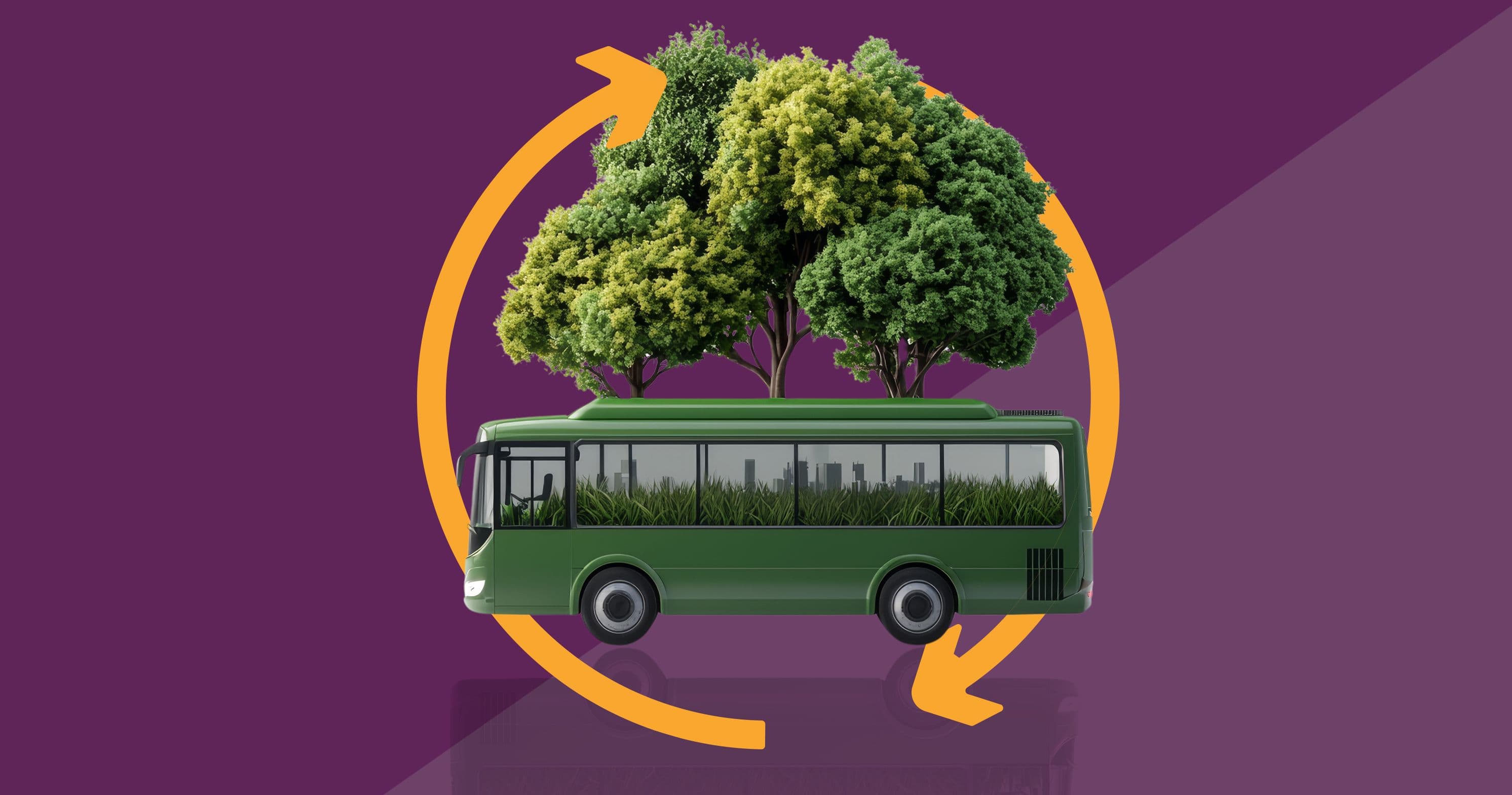
25/11/2024
How can transportation go beyond sustainability and become circular?
On this World Sustainable Transport Day, let’s reflect on how the Circular Economy can transform the mobility sector.
By Arlene Carvalho, from Circular Movement
The Circular Economy is increasingly recognized as a global sustainability trend, encouraging businesses, governments, institutions, and individuals to adopt more conscious and integrated practices. Its applications can be observed across various sectors, including mobility. With this in mind, on November 26, designated by the United Nations as World Sustainable Transport Day, we invite you to reflect: how can transportation go beyond sustainability and become truly circular?
The latest report on the topic was released by the UN in 2021. Titled “Sustainable Transport, Sustainable Development”, the document served as the basis for the second Global Conference on Sustainable Transport, held in Beijing, China, and online that same year. It highlighted data showing that in 2020, the transport sector accounted for 24% of direct CO2 emissions from fuel combustion worldwide. It also represented 57% of global oil demand and 28% of total energy consumption. However, transportation plays a crucial role in fostering connectivity, trade, economic growth, and job creation.
For Flávio Ribeiro, Professor, G20 and UN consultant, and Ambassador of Circular Movement, it’s essential to broaden the discussion when it comes to Circular Economy, especially in this field.
“Circularity in mobility goes far beyond reducing emissions. It involves rethinking the entire lifecycle of vehicles and transport systems, from production to resource reuse. It’s about integrating innovation, efficiency, and collaboration to create solutions that benefit both the planet and society. Mobility is a strategic topic for the current moment of the Circular Economy in Brazil, for instance, and reflects how circularity can be applied to sectors beyond production and waste,” he states.
According to Ribeiro, focusing exclusively on the productive cycle of transport is insufficient; a comprehensive approach to urban management and interconnections is needed. He introduces the concept of circular value networks, one of the primary ideas presented by the new Circular Economy ISO standard, now effective in Brazil and many other countries. This concept replaces traditional value chains, broadening the scope to include not only suppliers and customers but also all stakeholders committed to making circularity omnipresent.
“All stakeholders, from governments and companies to universities, cooperatives, and society itself, need to be engaged. Circular mobility requires network collaboration to create solutions that go beyond sustainability, promoting smarter, more inclusive, and efficient cities,” he continues.
Ribeiro also highlights Brazil's significant advancements in the Circular Economy in 2024, with expectations for further progress in 2025, especially concerning mobility. Among the listed achievements are:
- Bill 1874 of 2022, proposing the establishment of a National Circular Economy Policy (PNEC) and amendments to laws No. 10,332/2001 and No. 12,351/2010;
- Brazil's Circular Economy Strategy, launched in June this year;
- The Circular Economy ISO standards;
- The "New Industry Brazil" program;
- Brazil's Government Mover program;
- Brazil’s Future Fuel Law
Additionally, the ambassador sees many opportunities to make mobility genuinely circular, including:
- Optimization of transport systems for cargo and passengers, using multiple modes and better urban arrangements;
- Adopting new energy sources such as biofuels, biomethane, green hydrogen, and SAF (sustainable aviation fuel);
- More circular vehicles, enhancing equipment efficiency and production processes, incorporating solutions like remanufacturing and “product-as-a-service” models.
Thus, transportation emerges as an essential pillar for sustainable development, being, as the UN report states, crucial for achieving both the 2030 Agenda for Sustainable Development and the goals set in the Paris Agreement on Climate Change.
Transportation and circularity in practice
Circular Movement’s partner, Scania — a global manufacturer of trucks, buses, and industrial, marine, and power generation engines — has stood out for its commitment to leading the transition to a more sustainable and circular transport system. Its approach to sustainability is rooted in core values and responsible business practices, covering the entire value chain, from material sourcing to product end-of-life.
Patrícia Acioli, Sustainability Director of Scania’s Industrial Operation for Latin America, emphasizes that adopting a circular perspective in the transport sector is an urgent necessity.
“We operate in a highly resource-intensive sector, utilizing natural resources in our manufacturing processes and functioning within a linear business model. However, we recognize that circularity is the next horizon for our purpose, aligning with our vision and sustainability strategy. Therefore, it is both a necessity and an opportunity to impact the entire chain,” she explains.
“We have already embarked on this journey, and our goal is to promote awareness, raise consciousness, and make it clear that decarbonized transport and logistics are not enough—they must be circular throughout this process,” Patricia concludes. She also underscores that this challenge is shared by all. “We also know that we can’t change the world alone. Scania brings circularity into its business to inspire and drive momentum for progress,” she adds.
What, in your opinion, can be done to make transportation increasingly circular?
World Sustainable Transport Day 2024 Celebration
As part of World Sustainable Transport Day, Circular Movement is hosting the Circular Experience 2024 at Unibes Cultural in São Paulo, Brazil, sponsored by Scania. This exclusive event for partners and guests will bring together experts and industry leaders to discuss pathways and strategies for building a more efficient and collaborative circular society.
This year’s theme, “Innovation and Pathways for Circular Societies”, promises an unmissable program — including two panels featuring leading experts in the field and a networking lunch.
“World Sustainable Transport Day was established by the UN in 2023. Since then, we’ve used this date to promote discussions, solutions, and engagement on this agenda. This year, we’ve chosen to connect transportation with circularity. Additionally, it’s impossible to think about circularity without innovation, and that presents a tremendous opportunity for companies,” Patricia concludes.
About Scania
Scania is a global leader in sustainable transport solutions, with a 128-year history in manufacturing heavy trucks, buses, and industrial and marine engines. Together with its partners and customers, Scania is committed to leading the shift to a more sustainable transport ecosystem, creating a better world of mobility for businesses, society, and the environment.
About Circular Movement
Created in 2020, Circular Movement is a collaborative ecosystem committed to encouraging the transition from a linear to a circular economy. The idea that all resources can be reused and transformed is the motto of the Circular Economy, the basic concept of the movement. Circular Movement is an open initiative that promotes collaborative spaces with the aim of informing individuals and institutions that a waste-free future is possible through education and culture, the adoption of new behaviors, inclusion, and the development of new processes, products, and attitudes. The work is done in partnership with Dow, a chemical, plastics, and agricultural products company based in Michigan, USA. Circular Movement currently impacts 2 million people through its activations and content.
And you? Do you want to learn more about Circular Economy?
If you are interested in learning more about this topic, access Circular Academy, the first free Latin American course on Circular Economy aimed at the general public. Together, in partnership and collaboration, we can make a difference in building a more circular planet.

